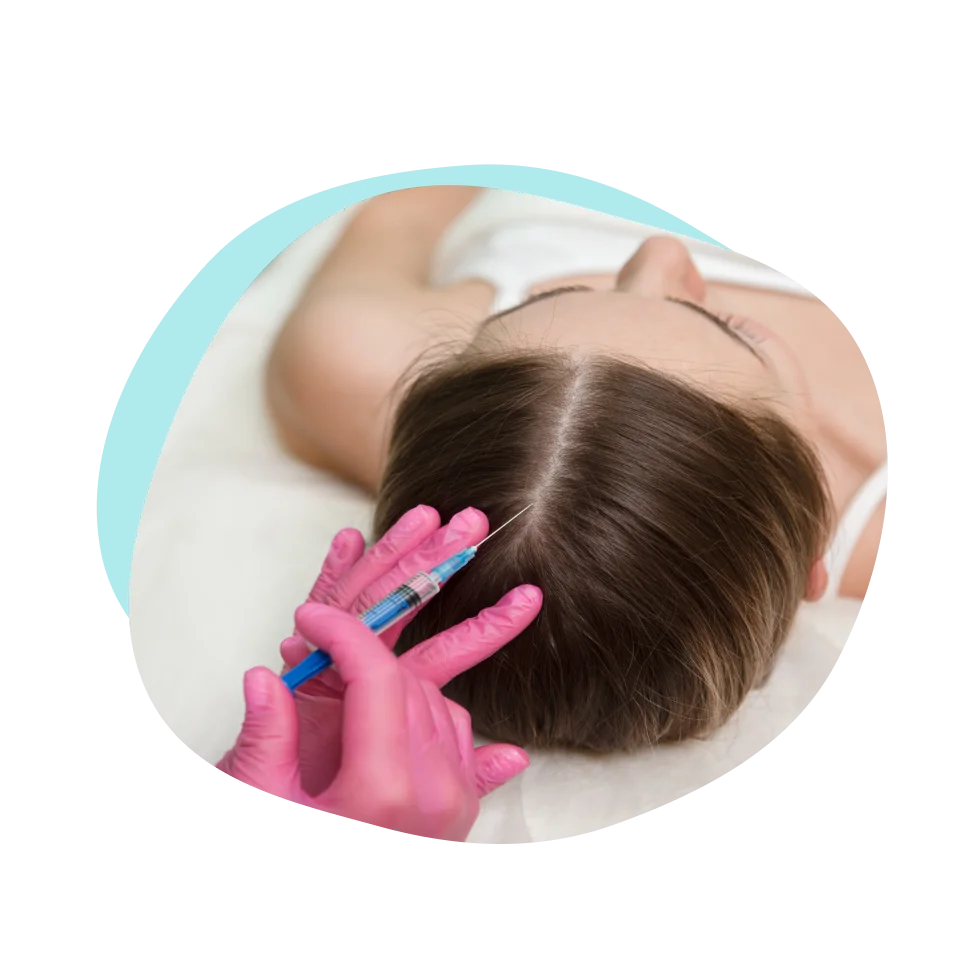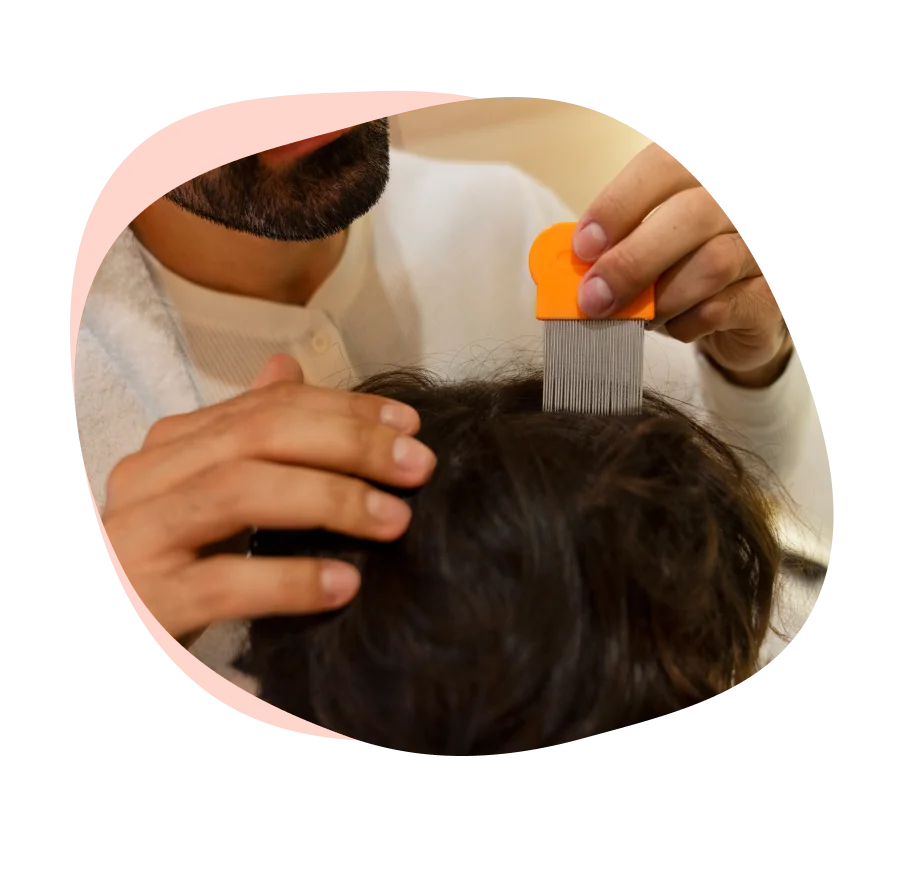Scalp Psoriasis
Scalp Psoriasis![]()
Understanding Scalp Psoriasis
Scalp psoriasis is a common manifestation of psoriasis, a chronic autoimmune disorder characterized by the rapid growth of skin cells. In scalp psoriasis, the immune system mistakenly attacks healthy skin cells, triggering inflammation and excessive skin cell production. This leads to the formation of red, raised patches covered with silvery scales on the scalp.
Symptoms of Scalp Psoriasis:
The symptoms of scalp psoriasis can vary from person to person but may include:
- Red, inflamed patches on the scalp
- Silver or white scales on the scalp surface
- Itching, burning, or soreness in affected areas
- Dry, cracked skin that may bleed
- Hair loss or thinning in severe cases
Causes of Scalp Psoriasis:
The exact cause of scalp psoriasis is not fully understood, but it is believed to involve a combination of genetic, immune, and environmental factors. Common triggers for scalp psoriasis flare-ups include:
- Stress
- Injury to the scalp
- Infections
- Cold weather
- Certain medications
- Hormonal changes
- Smoking and excessive alcohol consumption
Scalp Psoriasis![]()
![]()
![]()
![]()
![]()
Treatment Options for Scalp Psoriasis
While scalp psoriasis cannot be cured, various treatment options are available to manage symptoms and reduce flare-ups. Treatment may include:
- Topical Treatments: Over-the-counter or prescription-strength medicated shampoos, creams, or ointments containing ingredients like coal tar, salicylic acid, corticosteroids, or vitamin D analogs can help alleviate symptoms and reduce inflammation.
- Phototherapy: Light therapy, or phototherapy, involves exposing the scalp to controlled doses of natural or artificial ultraviolet (UV) light, which can slow skin cell growth and reduce inflammation.
- Systemic Medications: In severe cases, oral or injectable medications such as methotrexate, cyclosporine, or biologics may be prescribed to suppress the immune system and reduce inflammation.




Management Techniques for Scalp Psoriasis
In addition to medical treatment, certain lifestyle changes and management techniques can help individuals better manage scalp psoriasis:
- Maintain Scalp Hygiene: Wash the scalp regularly with a gentle, fragrance-free shampoo to remove scales.
- Avoid Triggers: Identify and avoid triggers that may exacerbate scalp psoriasis symptoms, such as stress, cold weather, or certain foods.
- Protect the Scalp: Protect the scalp from injury or irritation by avoiding harsh hair treatments, tight hairstyles, or scratching.
- Follow Treatment Plan: Stick to your prescribed treatment plan and follow up with your healthcare provider regularly to monitor progress and adjust treatment as needed.
Scalp Psoriasis![]()
![]()
![]()
![]()
![]()
Conclusion
Scalp psoriasis can be a challenging condition to manage, but with the right treatment and management techniques, individuals can effectively alleviate symptoms and improve their quality of life. By understanding the symptoms, causes, treatment options, and management strategies outlined in this guide, individuals with scalp psoriasis can take proactive steps towards better skin health and overall well-being.
Why Choose Us?


Premier Surgeons: Expert alumni from AIIMS Delhi with 10+ years of experience.


Maximum Viability: Optimize graft survival with cutting-edge advanced Technology (Realtime Bio- Enhanced FUE)


Natural Hairline Design: Achieve the most natural hairline with 3000+ success stories.


Uncompromised Safety: 100% doctor-led surgeries with strict safety protocols.
Scalp Psoriasis![]()
![]()
![]()
![]()
![]()
Frequently Asked Questions
What is scalp psoriasis?
Scalp psoriasis is an autoimmune disorder in which skin cells on the scalp grow too quickly and start to pile up, forming thick, scaly patches that can become inflamed, itchy, dry, and at times painful. It is a form of psoriasis that affects only the scalp.
What are the triggers of scalp psoriasis?
It can be developed because of being stressed, infected, exposed to the cold, skin injury, some medications for other illnesses, and smoking. Flares in reaction to some of these factors.
How is scalp psoriasis treated?
Medications include prescription topical corticosteroids, medicated shampoos containing coal tar or salicylic acid, and light therapy. More advanced cases may require systemic medications or biologics.
Can Scalp Psoriasis cause hair loss?
Although psoriasis itself doesn’t cause hair loss, the itching and scratching become so intense that it might result in temporary hair fall. The hair eventually grows back after the scalp is healed.
Is Scalp Psoriasis Contagious?
No, the scalp psoriasis is not a communicable disorder. Psoriasis is an autoimmune disorder and cannot be transmitted by touch from one person to another.
Can one's diet affect scalp psoriasis?
Yes. There are people who have reported relief after decreasing foodstuffs that cause inflammation, such as sugar, dairy, and gluten. An anti-inflammatory diet rich in fruits, vegetables, and omega-3 fatty acids can also have some benefits.
Compare and contrast dandruff with scalp psoriasis.
Both present with flaking of the scalp; however, one shows a milder condition without the presentation of red, thick plaques, whereas the other typically has red, thick plaques with a good deal more itching that extends past the hairline.
Reach Out for a Hair Transformation Today!
Contact Us.
Delhi: C-26, First Floor, Greater Kailash 1, New Delhi, 110048, India
Bhubaneswar: 2nd Floor, D 1 Square , Nandan Kanan Road , KIIT Square, Patia, Bhubaneswar, Odisha 751024
Uttarakhand: Gularbhoj Rd, near The Royal Gym, Dineshpur, Gurunanakpur, Uttarakhand 263160
Chennai: 39/2, RK Shanmugam Salai, Goutham Colony, K. K. Nagar, Chennai, Tamil Nadu 600078




